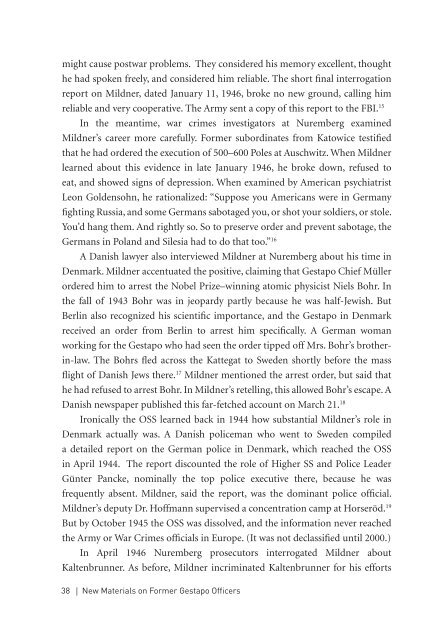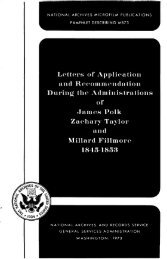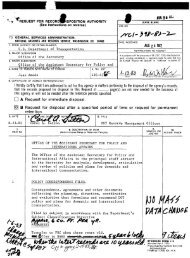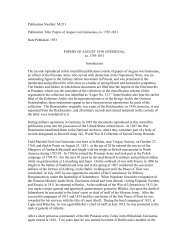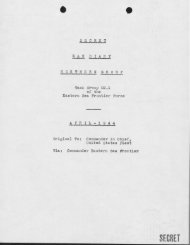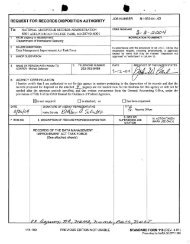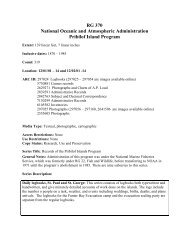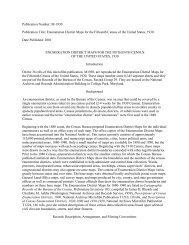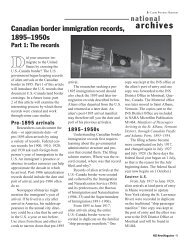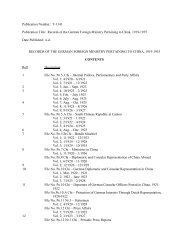HITLER'S SHADOW - National Archives and Records Administration
HITLER'S SHADOW - National Archives and Records Administration
HITLER'S SHADOW - National Archives and Records Administration
Create successful ePaper yourself
Turn your PDF publications into a flip-book with our unique Google optimized e-Paper software.
might cause postwar problems. They considered his memory excellent, thought<br />
he had spoken freely, <strong>and</strong> considered him reliable. The short final interrogation<br />
report on Mildner, dated January 11, 1946, broke no new ground, calling him<br />
reliable <strong>and</strong> very cooperative. The Army sent a copy of this report to the FBI. 15<br />
In the meantime, war crimes investigators at Nuremberg examined<br />
Mildner’s career more carefully. Former subordinates from Katowice testified<br />
that he had ordered the execution of 500–600 Poles at Auschwitz. When Mildner<br />
learned about this evidence in late January 1946, he broke down, refused to<br />
eat, <strong>and</strong> showed signs of depression. When examined by American psychiatrist<br />
Leon Goldensohn, he rationalized: “Suppose you Americans were in Germany<br />
fighting Russia, <strong>and</strong> some Germans sabotaged you, or shot your soldiers, or stole.<br />
You’d hang them. And rightly so. So to preserve order <strong>and</strong> prevent sabotage, the<br />
Germans in Pol<strong>and</strong> <strong>and</strong> Silesia had to do that too.” 16<br />
A Danish lawyer also interviewed Mildner at Nuremberg about his time in<br />
Denmark. Mildner accentuated the positive, claiming that Gestapo Chief Müller<br />
ordered him to arrest the Nobel Prize–winning atomic physicist Niels Bohr. In<br />
the fall of 1943 Bohr was in jeopardy partly because he was half-Jewish. But<br />
Berlin also recognized his scientific importance, <strong>and</strong> the Gestapo in Denmark<br />
received an order from Berlin to arrest him specifically. A German woman<br />
working for the Gestapo who had seen the order tipped off Mrs. Bohr’s brotherin-law.<br />
The Bohrs fled across the Kattegat to Sweden shortly before the mass<br />
flight of Danish Jews there. 17 Mildner mentioned the arrest order, but said that<br />
he had refused to arrest Bohr. In Mildner’s retelling, this allowed Bohr’s escape. A<br />
Danish newspaper published this far-fetched account on March 21. 18<br />
Ironically the OSS learned back in 1944 how substantial Mildner’s role in<br />
Denmark actually was. A Danish policeman who went to Sweden compiled<br />
a detailed report on the German police in Denmark, which reached the OSS<br />
in April 1944. The report discounted the role of Higher SS <strong>and</strong> Police Leader<br />
Günter Pancke, nominally the top police executive there, because he was<br />
frequently absent. Mildner, said the report, was the dominant police official.<br />
Mildner’s deputy Dr. Hoffmann supervised a concentration camp at Horseröd. 19<br />
But by October 1945 the OSS was dissolved, <strong>and</strong> the information never reached<br />
the Army or War Crimes officials in Europe. (It was not declassified until 2000.)<br />
In April 1946 Nuremberg prosecutors interrogated Mildner about<br />
Kaltenbrunner. As before, Mildner incriminated Kaltenbrunner for his efforts<br />
38 | New Materials on Former Gestapo Officers


